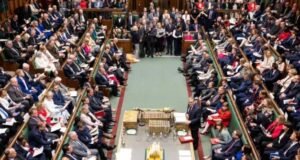
Government unveils £50m fund but admits no new money has been made available for it
A £50m fund to provide homes for people ready to leave homeless hostels or domestic abuse refuges in England has been announced by ministers, as part of a wider strategy aimed at eliminating rough sleeping by 2027.
The scheme is a response to the growing number of rough sleepers, but a cabinet minister conceded on Monday morning that no new funding had been made available.
The government had initially said it was spending £100m on the wider strategy, although the communities secretary, James Brokenshire, admitted in a radio interview that some of the cash was “reprioritised” from existing budgets.
When pressed about the £100m claim, Brokenshire said: “Half of that has already been committed to homelessness and rough sleeping. The other remaining half of this is money that is new to rough sleeping and homelessness, reflecting and recognising the priorities and importance of taxes.”
Rough sleeping has been increasing for the past seven years and, according to the latest official annual count, last autumn 4,751 people were on the streets in England, a rise of 15% on the year before. Critics say numbers have risen because of welfare and spending cuts and a failure to build enough new homes.
Ministers will invite bids to build the homes outside London; previously another £50m had been provided for a similar scheme in the capital. A further £17m will also be made available to fund about 15 pilot schemes aimed at trying to ensure rough sleepers do not spend a second night on the streets, as part of a scheme called Somewhere Safe to Stay.
Homelessness charities welcomed the package of measures but said ministers had to go further. The Rough Sleeping Advisory Panel, a group of seven charities and umbrella groups, said “bold, cross-departmental plans” were needed to tackle the causes of homelessness.
The panel said it was necessary “to build significantly more social housing, to foster greater security for renters, to ensure people have access to benefits and other support they need to help them keep their homes”. Healthcare, mental health and substance misuse services also needed to be easily accessible, it said.
Brokenshire has promised to review the strategy annually and look at some of the wider issues raised by the charities in their statement. “It is simply unacceptable that people have to sleep on the streets and I am determined to make it a thing of the past.”
The government also said it had stepped up housebuilding, with 217,000 homes constructed last year, although it said the market was “broken” because successive governments had not built enough.
A spokesman for the Ministry of Housing, Communities and Local Government said: “We want to make sure we get to the root of the problem unique to every local authority and tackle these reasons. This strategy is the first step of a nine-year plan towards ending rough sleeping by 2027, but it is just the beginning.”
Labour described the plan as “feeble” and lacking in urgency. John Healey, the shadow housing secretary, said: “The funding announced will barely register compared with the reckless Conservative cuts to affordable housing, social security benefits and homelessness services that have caused this crisis.”
The opposition pledged to end rough sleeping in its first term in office by making 8,000 homes available.
When introducing the strategy, Theresa May said nobody should have to sleep rough, but ministers recognised such situations were complex. “As well as ensuring people have somewhere to live, we have to deal with underlying problems and ultimately help people turn their lives around,” she said.
Don't Miss
- Rizvi rejects move to make July Charter a core principle of constitution
- Khaleda Zia urges govt to ensure advanced treatment for Farida Parveen
- Country’s 95% primary kids exposed to nicotine
- 4 die ‘inhaling toxic gas’ in Moulvibazar tea garden
- July movement’s impact on classes reflected in SSC exam results: Sylhet board chairman
 Weekly Bangla Mirror | Bangla Mirror, Bangladeshi news in UK, bangla mirror news
Weekly Bangla Mirror | Bangla Mirror, Bangladeshi news in UK, bangla mirror news







